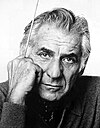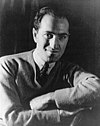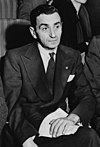 Aaron Copland
Aaron Copland


American composer, composition teacher, writer, and conductor (1900-1990).
Born November 14th, 1900 in Brooklyn.
Died December 2nd, 1990 at 90 years old in Sleepy Hollow (Alzheimer's disease, respiratory failure).
Aaron Copland, the renowned 20th century American composer, passed away on December 2, 1990, at the age of 90. His body of work, spanning classical and popular genres, made him a giant of American music and an icon of the modernist era. He received many honors in his lifetime, including two Pulitzer prizes and a National Medal of Arts. Born in Brooklyn in 1900, Copland was encouraged to pursue music despite his parents’ wishes for him to become a lawyer. He composed his first major work at age 19, and went on to write ballets, symphonies, and movie scores, including scores for acclaimed films such as "The Heiress," "The Red Pony," and "Our Town," for which he was awarded an Academy Award. His compositions, often inspired by folk songs and tied to the American landscape, drew heavily on jazz and regional American idioms, creating a unique, "American" sound. Copland wrote many beloved classical choruses and concertos, including "Appalachian Spring," "Old American Songs," "El Salón Mexico," and several works for solo piano. Over the course of his lifetime, he received numerous awards and honors, including a Guggenheim Fellowship, two honorary degrees from Harvard University, and a Presidential Medal of Freedom. Throughout his life, Aaron Copland was a key figure in the advancement of American musical culture. His impeccable attention to detail and creativity defined him as a master of his craft, and his works, from the popular to the classical, remain among the most recognizable in the American music canon.
You might also be interested in...





No one here gets out alive. Jim Morrison